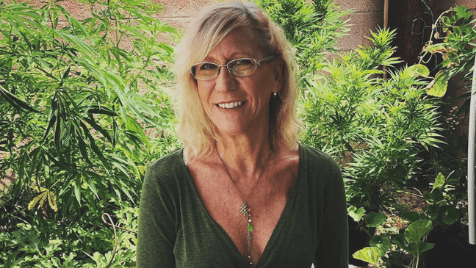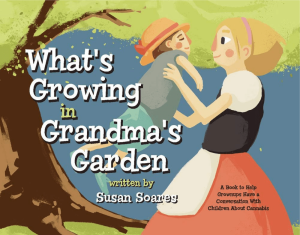We can all agree that for the most part, children and cannabis don't mix. We've just started studying the endocannabinoid system and we don’t know nearly enough about it. However, we do know that the brain is developing until one’s mid-twenties and that messing with that development isn't wise. So, what do we say to our young people curious about cannabis use? You wouldn't hide the fact that you take heart medication from your children. So why hide the fact that you take cannabis? Here's the story of one grandmother and her efforts to break the stigma and promote safe use.
Prior to her cannabis advocacy, Susan Soares was very anti-cannabis. After a sports-related incident left her with constant headaches, Susan became somewhat desperate and opened her mind up to alternative remedies. Her neighbor offered her a different kind of medicine straight from her garden. Her headaches soon subsided, giving her a new perspective on the plant. This kick-started Susan's activism in the industry and eventually led her to establish the non-profit organization Cannabis Awareness Rallies and Events (CARE).
her to establish the non-profit organization Cannabis Awareness Rallies and Events (CARE).
Susan started interviewing various cannabis users about how they approach the subject of cannabis with their children. She found that less than 5% of parents were openly discussing it with their children. Some of these people even worked in the industry! “This one gentlemen told me that his eight-year-old son made the best Manhattan. He mixes his cocktails for him, but he can’t talk to him about cannabis,” Susan mentions when being interviewed by The Woody Show.
When people keep secrets, it suggests that they are doing something wrong. This only feeds the negative stigma and judgment surrounding cannabis. When the younger generation becomes curious about cannabis, they’re very likely to fear that judgment and that immediately demolishes the conversation. Susan believes that educating young people about cannabis before they ever use it is the safest option.
 Susan, a resident of California where Medical Cannabis has been legal for decades, decided that the best way to get the information to children was to provide their parents with an aid for the discussion. It needed to be something lighthearted and simple enough for a child to enjoy, while also touching on the importance of waiting to try this plant that adults are so enthused about. She decided to write a children’s book about cannabis. Yes, you read that correctly. A children’s book about cannabis!
Susan, a resident of California where Medical Cannabis has been legal for decades, decided that the best way to get the information to children was to provide their parents with an aid for the discussion. It needed to be something lighthearted and simple enough for a child to enjoy, while also touching on the importance of waiting to try this plant that adults are so enthused about. She decided to write a children’s book about cannabis. Yes, you read that correctly. A children’s book about cannabis!
What’s Growing in Grandma’s Garden tells the inspired-by-real-life-events story of a grandson’s curiosity of his grandma’s locked greenhouse full of cannabis plants. The book begins by describing the garden from her grandson’s point of view. Preparing for lunch, Grandson picks sweet potatoes while Grandma gets raw cannabis flower from her greenhouse to add to her smoothie. She brings her grandson into the greenhouse and says that he can look but not touch because it’s for adults. When her grandson asks why, Grandma draws a brain on the pavement with chalk. She explains to her grandson that his brain is still developing, and that he needs to fuel that development with the right things to make sure his brain grows strong and fast.
Later, when Grandma’s knees hurt from kneeling on the sidewalk, she applies cannabis oil to them, referred to by her grandson as “her medicine.” Grandma’s friends and family come over for a weekly BBQ. While kids run and play, some of the adults “do grown-up things” like drink wine, and Grandma enjoys a joint downwind of the party by the greenhouse.
Susan feels – and we agree! – that it's important to be upfront about why adults enjoy things like cannabis and wine that get them intoxicated. “Intoxication is an interesting subject. If you notice on the cover of the book, the grandmother is spinning the grandson around. And the reason for that is that kids like to spin around, they like to feel dizzy, to alter their reality – it’s a form of intoxication.” In order for young people to stay safe regarding intoxication, there needs to be an open conversation with someone they can be honest with. It is no different than discussing swearing, alcohol, or sex with your children. Susan hopes her book helps drive conversation about all the “grown-up things.”
What do your children know about cannabis? Are you informing them or are you letting them gather information on their own? If left to find their own sources, children will likely have fear-based information or industry-driven information to choose from. In a world where cannabis has become more and more popular, much of the fear-based information is being disregarded, while the industry continues to focus on the health benefits of cannabis. Yes, it's true that cannabis is healthy for well-balanced adult use. However, it could damage a child’s endocannabinoid system, and you may not want “cannabis is healthy!” to be the only thing your child hears.
If you are a Medical Cannabis user, how do you approach the topic with your kids? Comment below; your experience may help another fellow cannabis user start a necessary dialogue. It's time to open the conversation, end the stigma, and protect your children.
Hartley, Meg. "Why This Author Wrote a Book about Cannabis for Parents and Children," Leafly, Privateer Holdings, January 21, 2020.
H, Chris. "New Book Urges Adults to Help Children 'Just Say Know' to Cannabis," Puff Puff Post, Puff Digital, October 1, 2019.